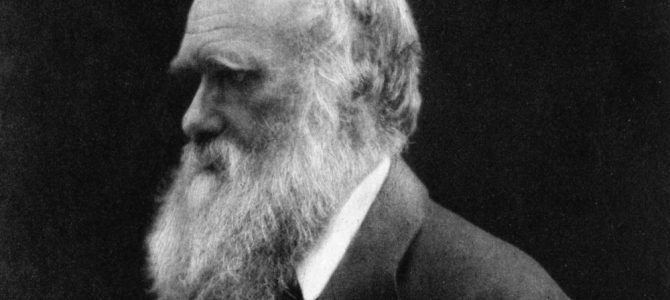
Progressives are firmly committed to “choice” on selective issues, like abortion and gender selection. But when it comes to schools, choice is not an option.
The issue flared up during confirmation hearings for Betsy DeVos as Education Secretary. Now, we can expect a full-out assault as the Trump Administration unveils legislation to fund school vouchers for disadvantaged youth, thus allowing families, in the president’s words, “to choose the public, private, charter, magnet, religious or home school that is right for them.”
By thwarting efforts to advance school choice, progressives seek both to preserve their ideological hegemony in the field of education, and to fortify the wall separating children from those who might infect them with silly fables, or antiquated notions of right and wrong.
How Charles Darwin Relates To School Choice
Given progressives’ admiration of Charles Darwin—as indicated by the ubiquity of bumper stickers bearing his name or portraying a large faith-eating fish—it might be worth asking whether Darwin’s own words on the formation of morals support or undercut progressive’s views on school choice. Darwin’s comments on this topic in “The Descent of Man” (chapters IV, V, and XXI) provide the answer.
For Darwin, the “standard of morality” was straightforward: what conduces to “the general good or welfare of the community.” Using this touchstone, he was quick to see that the ruthless process of natural selection was incompatible with the moral sensibilities of civilized societies. He explains:
With savages, the weak in body or mind are soon eliminated; and those that survive commonly exhibit a vigorous state of health. We civilised men, on the other hand, do our utmost to check the process of elimination”—via institutions for the sick, insane, maimed, and poor. As a result, “the weak members of civilised societies propagate their kind.
Darwin notes that no animal breeder would ever allow the weak of body or mind to reproduce, given “the undoubtedly bad effects.” But civilized societies both help the weak survive, and allow them to reproduce. As a result, “the reckless, degraded, and often vicious members of society tend to increase at a quicker rate than the provident and generally virtuous members.”
Why Religion Is Inexplicably Linked To Education
Simply stated, Darwin feared that civilization would regress as its weakest members were allowed to flourish. But he also realized that the alternative—allowing or assisting the weak to be weeded out—would constitute “an overwhelming present evil.” So how is civilized society to resolve this dilemma?
Darwin’s answer was succinct, but comprehensive:
The more efficient causes of progress seem to consist of a good education during youth whilst the brain is impressible, and a high standard of excellence, inculcated by the ablest and best men, embodied in the laws, customs and traditions of the nation, and enforced by public opinion.
Unpacking this sentence makes clear that religion and education, in Darwin’s mind, were inextricably linked. He celebrated the fact that “man has risen, though by slow and interrupted steps, from a lowly condition to the highest standard yet attained by him in knowledge, morals and religion.” Darwin went on to define “the highest form of religion” as “the grand idea of God hating sin and loving righteousness.” He also made reference—agnostic though he was—to “the ennobling belief in God” and, citing Jesus, called the Golden Rule the “foundation of morality.”
In the final chapter of the book, Darwin added this tidy summary of the role of religion in modern civilization: “With the more civilized races, the conviction of the existence of an all-seeing Deity has had a potent influence on the advance of morality.”
Darwin Believed Education Should Foster Virtue
Today, most would assume such words came from a cultural conservative. The basic idea: Civilized society devolves from morality, and morality devolves from religion. Clearly, had he outlined an educational program, Darwin would not have excluded moral standards and religious beliefs—the same beliefs and standards contemporary progressives expend a great deal of time, money, and energy trying to scuttle.
Rather, Darwin would have urged others to help strengthen the “self-regarding virtues” (he names chastity and temperance in particular) and the “power of self-command.” How? Through “habit, instruction and religion.”
To their shame, today’s progressives do not exhibit the same open-mindedness. Nor do they display the same regard as Darwin did, if any, for the cultural legacy of the Christian religion. But most disturbingly, they have not offered a healthy and humane response to the weaknesses of character proliferating in contemporary culture, as evident in the prevalence of drug addition, family disruption, street crime, and welfare dependency.
Progressives Believe In Natural Selection Even More Now
Aside from failed social programs, it would appear that progressives’ only real answer to these maladies is the aggressive promotion of abortion in impoverished neighborhoods as a means to curb the propagation of undesirables. Insofar as that is true, today’s practitioners of the Golden Rule must view this strategy as—applying Darwin’s words—“an overwhelming present evil.”
To mitigate the cruel and cumbersome dynamics of natural selection, Darwin thought it incumbent upon those who enjoy “the highest standard yet attained … in knowledge, morals and religion” to bequeath the legacy to others—in part, through a good education.
Surely it is time for progressives to reassess the limits of an educational system devoid of serious moral and spiritual content. Even if they don’t want educational alternatives for their own children, it is high time to allow other families to choose, if they so wish, an education informed by traditional faith and morals. Darwin would doubtless agree.









